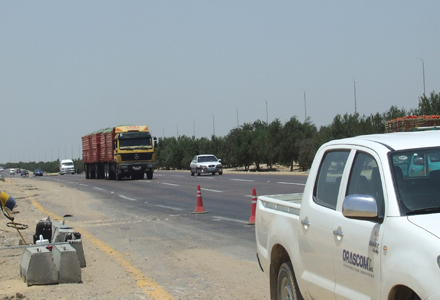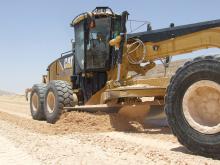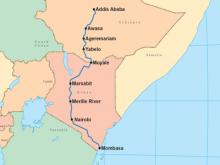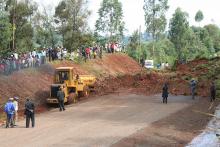Road transport is the key to improving Africa's links within its own territory, and further afield as Patrick Smith reports. Development of road transportation is the key to the future of the African economy, and countries on the continent are making great strides. According to a report by a transport infrastructure expert at the New Partnership for Africa's Development (NEPAD), within the next 15 years the value of trade in Africa could reach US$250 billion if a $32 billion investment is made to integrate

Road transport is the key to improving Africa's links within its own territory, and further afield as Patrick Smith reports
Development of road transportation is the key to the future of the African economy, and countries on the continent are making great strides. According to a report by a transport infrastructure expert at the New Partnership for Africa's Development (NEPAD), within the next 15 years the value of trade in Africa could reach US$250 billion if a $32 billion investment is made to integrate Africa's road infrastructure.NEPAD's traffic expert, Dr John Tambi, says that Africa could be integrated with a new road network measuring a total of 60,000-100,000km. Africa currently has continental trade of $200 billion/year.
"NEPAD recognises that without infrastructure, regional integration will not be realised." Africa is the world's second-largest and second most populous continent with over 1 billion people in 61 territories.
According to NEPAD its topography and climate range from deserts in the north to mountainous jungles in the central parts, and even more changes further south.
"It is this vastness and variety that makes travelling, whether by road, rail and even by air, in Africa such a challenge. The New Partnership for African Development (NEPAD) is finding ways of integrating and simplifying transport infrastructure in Africa," says the organisation.
"NEPAD is an African Union strategic framework for pan-African socio-economic development, and is both a vision and a policy framework for Africa in the 21st century. It is a radically new intervention, spearheaded by African leaders, to address critical challenges facing the continent: poverty, development and Africa's marginalisation internationally.
"It provides opportunities for African countries to take full control of their development agenda, to work more closely together, and to cooperate more effectively with international partners." NEPAD points out that the challenges experienced in creating a viable transport network that not only connects Africa with the world, but also within the continent itself are many, and these include the current political changes and demands in North and West Africa. Ongoing actions have seen a halt to some construction work.
However, through NEPAD the priority has been to create a network for cross-border transport, including air, road, rail and shipping that will make it easier to create viable trade on the continent. The importance of a viable transport infrastructure system is closely connected to the economic, technological and social renaissance of Africa.
Ambitious projects The short-term goals and projects currently underway are all part of the bigger picture: the creation of a fully connected African continent, where its grim road safety record, a major issue in Africa, must also be tackled.
One ambitious project is the Trans-African Highway network trans-continental road projects, which are being developed by the United Nations Economic Commission for Africa (UNECA);
However, given the unrest in North Africa at present, it is no surprise that the development of the North African Highway running 5,600km from Morocco through to Egypt is being delayed.
Morocco and Algeria are close to completing their sections of the highway while work is at an advanced stage in Tunisia and Egypt. Libya however has been sluggish to start its share of the project though and with the country's deeply troubled situation at present, it is not clear when the highway construction work will be able to continue.
The highway will be of enormous economic importance to North Africa, as well as East Africa and the Middle East, when it is finally completed and will help stabilise the region in the future.
The route will link key ports in North Africa and the Middle East in particular, while providing an important trade route between the various nations.
Egypt will become the centre for through-traffic, with projects such as the upgrade of the Cairo-Alexandria highway also providing a link between the North African Highway and a major port.
However, the North Africa Highway has already faced major challenges in addition to the recent political changes in the region, with the route providing difficult geological conditions.
Some contractors have also proved unequal to the task of building a road that meets requirements, and in Algeria a number of companies have been told that they will not be allowed to tender for work in the country again.
Another major project is the US$6.56 billion East-West Highway in Algeria, one of the world's largest public construction projects, which is part of Algeria's highway expansion programme and connects with neighbouring North African nations Tunisia and Morocco and forms part of the North African Highway.
This makes it the biggest highway project ever undertaken in Africa, as well as a landmark infrastructure investment for Algeria.
The new six-lane highway with a total length of 1,216km runs from the Tunisian border in the east of Algeria to the Moroccan border in the west and will link Algeria's large cities including Algiers, Setif, Constantine and Oran, while transversing Libya, Tunisia, Algeria, Morocco and Mauretania.
Eleven tunnels and 25 viaducts have been constructed along the new highway.
In a country of nearly 36 million people and where 85-90% of vehicle traffic involves the movement of goods, this new highway will have a major impact on the country's previous congestion problems.
Algeria's highway construction programme has come as the country's economy has started to grow. Each year since 2002 has seen an increase of around 30% in the country's business activity.
And with a budget of US$15 billion earmarked by the Algerian government for expanding the country's transport infrastructure over the coming five years, activity is set to continue. Meanwhile, a technical study worth US$5.9 million is starting for Tunisia's Kairouan-Enfidha highway.
It is being financed by the
The Tunisian Ministry for Transport and Equipment has increased the scale of its rural road upgrade programme. In all some 1,750km of rural roads will now be upgraded and repaired compared to the 750km originally planned. A further $184.5 million has been allotted to improving and developing the country's highway network. Of this sum, 20% will be used to improve coastal highways and 80% for inland road links.
Other African nations are also carrying out ambitious highway projects to improve links, and these include Kenya, where a major road sub-sector improvement programme is being implemented focusing on rehabilitating and constructing new national roads to link the country with its neighbours and beyond (see following article).
Improvements are also planned for the road linking Mombasa International Airport in Kenya with the Kisumu-Kakamega-Webuye-Kitale road. A loan worth US$300 million has been approved by the
Also on the cards is an upgrade to the road link connecting the cities of Kampala (the capital) and Entebbe in Uganda, which will be funded by a loan worth US$350 million being provided by the Chinese Exim Bank.
The work will focus on upgrading a 37km section of road from the Busega-Mityana junction to the Entebbe road at Kajjansi. In addition, a 14km spur will be built to connect 14km from Munyonyo to Lweza.
Zambia is to also planning to spend nearly US$211 million to upgrade urban roads with the additional mining tax revenue and an international bond worth US$500 million providing funds.
Dr Situmbeko Musokotwane, the country's Finance and National Planning Minister, said that the country's economy development is expected to exceed 7% for 2011 mainly from infrastructure growth, while inflation stays within 8%.
In 2010, the Zambian economy registered a 7.1% growth, and in April 2011, the country's consumer inflation headline dropped year-on-year to 8.8%, with a bumper maize harvest of over 3 million tonnes being attributed to inflation remaining within 8%.
Gauteng project
Milestones are being reached on South Africa's Gauteng Freeway Improvement Project (GFIP), which comprises different phases to upgrade and implement new freeways of an ultimate 560km freeway network.The first phase, comprising the upgrading of 185km of the most congested freeways is currently under construction (a total of 15 work packages).
The project predominantly concentrates on the N1 between Tshwane and Johannesburg, the country's largest city. It also includes other major arteries such as the N3, N12, N17 and the R21 route from Tshwane to OR Tambo International Airport.
Gauteng is the economic heartland of South Africa, and currently generates 38% of its economic activity. Over the years, Gauteng has developed beyond its infrastructural capabilities, with national roads unable to keep abreast of increasing traffic demands.
This has severely affected traffic flow and the economy as a whole, ultimately resulting in decreased productivity in the workplace as well as limited family and leisure time.
Apart from the substantial widening of freeways, the GFIP project will ensure that bottlenecks at interchanges are reduced.
According to the South African National Roads Agency (SANRAL), the relief is already evident, as motorists are enjoying much freer flowing traffic through the 20 recently completed intersections. A total of 34 Interchanges are upgraded in phase I of the GFIP.
Furthermore, median lighting and Intelligent Transport Systems (ITS) will be provided on the network.
ITS, comprising variable message signs (VMS), CCTV cameras and incident management services, allow SANRAL to manage the national road network in Gauteng for optimal use of the road capacity available.
With the planning of the Gauteng Freeway Improvement Project, SANRAL took other transport modes into consideration (the Gautrain, Metrorail and Bus Rapid Transport) and strived to create links with other transport modes to provide citizens with the choice of using public transportation or car-pooling that will alleviate congestion caused by single-passenger vehicles.
Nigeria's road repair aims
Mike Woof discusses proposals to improve the standard of roads in Nigeria.
Nigeria's Federal Roads Maintenance Agency (FERMA) is setting targets to improve road repair and maintenance standards in the country.
The country has a pressing need to upgrade its transport infrastructure and the road network in particular.@@@
Engineer Kabir Abdullahi is managing director and CEO of FERMA. He said, "Around 50-60% of roads in Nigeria are in bad shape." Although Nigeria is a major oil producing nation, its road network has been starved of investment and is in extremely poor condition. This situation has also exacerbated the country's serious road safety problem and these factors have combined to deliver a major impact on Nigeria's economic development.
With a total road network of some 200,000km (including many unsurfaced rural roads) Nigeria's economy relies heavily on road transport.
FERMA however is setting tough targets on improving the country's road network.
Abdullahi said: "We are repairing and maintaining roads. In the next 2-3 years we hope that only 20% of the network will still be in poor condition and 80% will be in good shape." This aim, however, represents a major challenge as Abdullahi concedes. FERMA is responsible for maintenance to the country 35,000km network of Federal and State Roads. At present around 99% of the Federal Roads are surfaced, either with asphalt or in some cases with surface dressing. Improving this network will require Nigeria's Federal Government to increase its road maintenance budget and boost the funds available to FERMA.
Abdullahi said that he is bargaining hard with the Nigerian Government for the funds that will be required. FERMA's plans are modest in terms of road upgrades though and do not call for a major widening programme, although Abdullahi said, "We will widen the shoulders a little." In a bid to maximise the benefits to the network from the available budget, FERMA is also making use of Nigeria's universities. FERMA's research and development department is partnering with universities to research road recycling and stabilisation techniques in particular. A series of pilot schemes are being carried out during 2011 and these include an investigation of some of the latest full-depth recycling techniques.
Nigeria's soft earth conditions (in the south of the country) or sandy soils (in the north of the country) suit the use of various recycling technologies and could yield substantial cost benefits with regard to road repairs, which is why FERMA is keen to investigate available systems, according to Abdullahi. He said that a trial of full-depth reclamation technologies will be carried out on a 130km road project in Niger State, as part of the pilot programme.
An Italian contractor is handling this road recycling project and if successful, it could point the way ahead for a widespread introduction of the techniques right across Nigeria.







